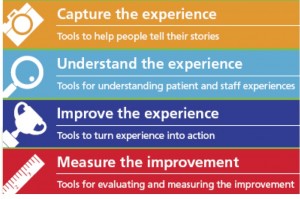This post links three recent things I have been reading. The first is to mention the Experience Based Design (EBD) approach developed by the National Health Service in the UK (link). I have been meaning to write about this for a while, because it seems to be gaining traction in other countries also. I particularly like the way that they have demystified the process, and have worked really hard to empower change at all levels of the organisation. After working in healthcare innovation I see how important it is with change management that empowers at all levels. I think that there is a real area of common ground here, and I hope that the initiative cements itself in the NHS. Â I know that it is spreading, and have recently been contacted by several healthcare providers in Norway, who are thinking in the same direction. To me, this looks suspiciously like a serious change that is about to sweep over public services.
Then, to my surprise, I read today (link) that nurses in the NHS will be formally evaluated on their ability to provide compassionate care. I see this as being a significant step in the direction towards experience-centricity since (unfortunately) our on the job performance is often directed towards the formal measures that are used to evaluate us. I really liked the health minister saying that service provision is “not what we do, but how we do it”. I guess she means both, but if the thought of “how we do it” can become something that aligns the health service in the future, then I think the health service is on track to become something very good.
She said her guiding principles would be “care, compassion, commitment and courageâ€, to which have been added two more “Csâ€, competence and communication.
This made me think of the third piece I was going to write about (link). Its a piece from Forbes titled “Do Starbucks Employees Have More Emotional Intelligence than Your Physician”?. It highlights something that I guess challenges the above initiatives, because I think that compassion is considered something for nurses but not for doctors or consultants in the NHS. For some reason, their behaviour and tone of voice are rarely challenged. The article shows how Starbucks employees are trained to handle situations with perceived service breakdown. They use the LATTE approach –
“We Listen to the customer, Acknowledge their complaint, Take action by solving the problem, Thank them, and then Explain why the problem occurredâ€
Now, if we could conceive something similar for the health service, to help design the service personality, behaviours, tone of voice and ensure this is embodied in all services, then we could come a long way. Maybe LATTE doesn’t really fit healthcare. A good catchy term is needed, but more importantly focus upon the how of healthcare.
